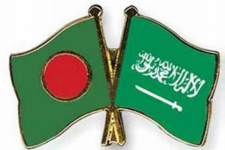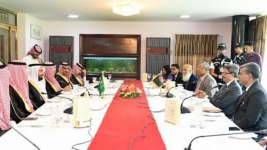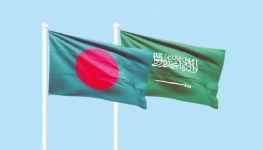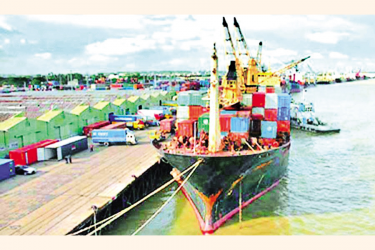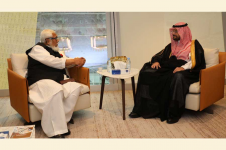Saudi crown prince to visit Bangladesh this year: Ambassador
15 Mar 2024, 2:28 pm
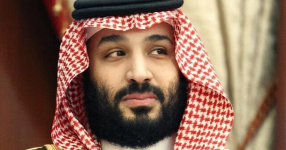
NN Online Report: Saudi Crown Prince Mohammed bin Salman bin Abdulaziz Al-Saud, who is also the Prime Minister of the Kingdom of Saudi Arabia, will pay an official visit to Bangladesh later this year.
This would be a landmark event in the history of bilateral relations between Bangladesh and Saudi Arabia leading to the consolidation of ties, especially in trade and commerce, investment and economic cooperation, both sides think.
“The Saudi crown prince has accepted the invitation extended by Prime Minister Sheikh Hasina of Bangladesh to visit the country this year. The date is yet to be fixed, however,” said Saudi Ambassador to Bangladesh Essa Yussef Essa Al Duhailan.
It would be the first ever visit of any Saudi crown prince to Bangladesh after 1985 when the then Saudi Crown Prince Abdullah bin Abdulaziz visited Dhaka.
A good number of bilateral instruments — MoUs and agreements—will be signed during the visit of the Saudi leader, which would strengthen the bilateral ties between the two countries significantly, both sides hope.
During the visit, the Saudi envoy said, the issues of mutual interests and ways to strengthening bilateral relations between Saudi Arabia and Bangladesh will be discussed.
The Saudi ambassador talked to reporters after launching the distribution of food baskets on Thursday.
He hoped that the proposed visit of the crown prince will take place soon at a convenient time.
Meanwhile, the Saudi foreign minister has recently assured of further discussing this upcoming visit mentioning that Saudi Arabia considers their engagement with Bangladesh on the basis of sophisticated economic cooperation which has taken place during the last three years.
The ambassador said his country is planning to invest $1.2 billion in Bangladesh and Saudi company Red Sea Gateway Terminal will start operating the Patenga Bay Terminal in Chattogram next month.
Regarding the distribution of food baskets, the envoy said a total of 15,500 baskets of food items, each containing 24kg of food, will be distributed among the vulnerable people in 32 places across the country.
Under the instructions of Saudi King Salman bin Abdulaziz Al Saud and Crown Prince Mohammed bin Salman, the food items are being provided to the vulnerable people as a symbol of solidarity.
The envoy said about 2.8 million Bangladeshis working in Saudi Arabia are also making significant contributions to Saudi and Bangladesh economies.
15 Mar 2024, 2:28 pm

NN Online Report: Saudi Crown Prince Mohammed bin Salman bin Abdulaziz Al-Saud, who is also the Prime Minister of the Kingdom of Saudi Arabia, will pay an official visit to Bangladesh later this year.
This would be a landmark event in the history of bilateral relations between Bangladesh and Saudi Arabia leading to the consolidation of ties, especially in trade and commerce, investment and economic cooperation, both sides think.
“The Saudi crown prince has accepted the invitation extended by Prime Minister Sheikh Hasina of Bangladesh to visit the country this year. The date is yet to be fixed, however,” said Saudi Ambassador to Bangladesh Essa Yussef Essa Al Duhailan.
It would be the first ever visit of any Saudi crown prince to Bangladesh after 1985 when the then Saudi Crown Prince Abdullah bin Abdulaziz visited Dhaka.
A good number of bilateral instruments — MoUs and agreements—will be signed during the visit of the Saudi leader, which would strengthen the bilateral ties between the two countries significantly, both sides hope.
During the visit, the Saudi envoy said, the issues of mutual interests and ways to strengthening bilateral relations between Saudi Arabia and Bangladesh will be discussed.
The Saudi ambassador talked to reporters after launching the distribution of food baskets on Thursday.
He hoped that the proposed visit of the crown prince will take place soon at a convenient time.
Meanwhile, the Saudi foreign minister has recently assured of further discussing this upcoming visit mentioning that Saudi Arabia considers their engagement with Bangladesh on the basis of sophisticated economic cooperation which has taken place during the last three years.
The ambassador said his country is planning to invest $1.2 billion in Bangladesh and Saudi company Red Sea Gateway Terminal will start operating the Patenga Bay Terminal in Chattogram next month.
Regarding the distribution of food baskets, the envoy said a total of 15,500 baskets of food items, each containing 24kg of food, will be distributed among the vulnerable people in 32 places across the country.
Under the instructions of Saudi King Salman bin Abdulaziz Al Saud and Crown Prince Mohammed bin Salman, the food items are being provided to the vulnerable people as a symbol of solidarity.
The envoy said about 2.8 million Bangladeshis working in Saudi Arabia are also making significant contributions to Saudi and Bangladesh economies.








